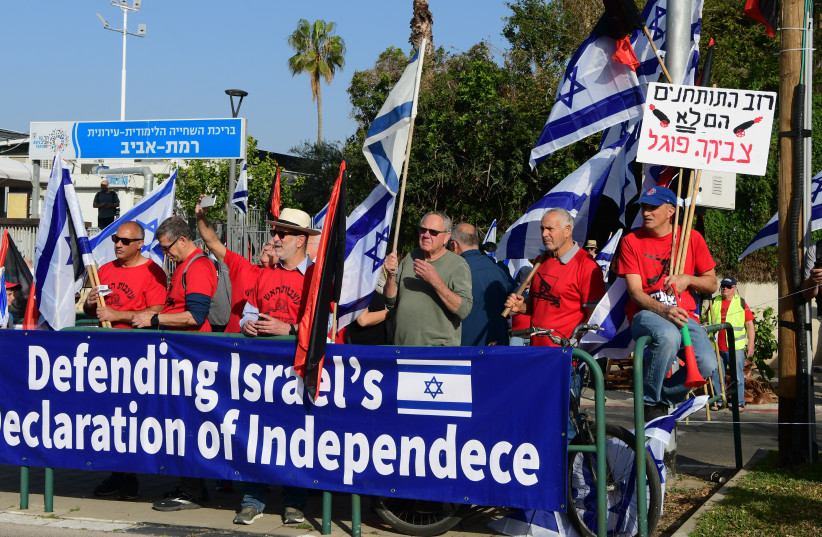Prime Minister Benjamin Netanyahu upped the ante on the conflict within Israel’s security forces on Sunday when he directly called on the various security chiefs to support his policies in the face of opposition.
Of course, Netanyahu framed the order he issued in terms of IDF chief-of-staff Lt. Gen. Herzi Halevi cracking down on IDF soldiers “refusing.”
Netanyahu framed the order he issued in terms of IDF Chief of Staff Lt.-Gen. Herzi Halevi cracking down on soldiers’ “refusing.” To Shin Bet (Israel Security Agency) Director Ronen Bar, he framed it in terms of cracking down on incitement to violence against the prime minister and other ministers.
His verbiage regarding the police was that they should prevent anti-Netanyahu protesters from blocking highways.
Benjamin 'spin doctor' Netanyahu
All of the security chiefs in one way or another were being called on to help him “fight the anarchists” and restore regular life in the country.

The problem is that Netanyahu, a master spin doctor, prepared his messages while ignoring some critical nuances.
The current push of “refusing” to show up for duty in the IDF is not by young soldiers who are obligated to serve, but by much older, more senior reservists who can pretty much quit whenever they want and are part of an elite group of around 1.5% of the country that does serious reserve duty.
This means they have already served for many years, often in more dangerous units than the vast majority of service members.
Halevi is actually almost powerless to force the reservists to show up for duty. When IAF Commander Maj.-Gen. Tomer Bar wanted to punish Col. Gilad Peled for allegedly being a leader among the reservist strike movement, his only real recourse was to suspend him from the reserves.
So the punishment for reservists who threaten to not show up for a few weeks would be to potentially sideline them for longer? How would this prevent losing the volume of combat pilots ready and needed for operations on all of Israel’s borders?
There is no real answer to stopping the reservist strike other than either the very careful tiptoeing Halevi has been doing to try to manage the conflict until it resolves or there being an actual compromise resolution that addresses the strikers’ concerns.
With the Shin Bet, there has been incitement, arrests and indictments. But the vast majority of protests are peaceful, and the number of threats is viewed as less than in the past against more centrist or left-wing leaders.
When the volume of real threats hit new highs, former Shin Bet director Nadav Argaman did not need to be told to issue a warning about public incitement; he issued one himself. Argaman has not joined any political camp.
So again, other than starting to crack down on criticism of the government, it is not clear if Netanyahu had specific examples where he thought the Shin Bet was being too lenient.
The police have arrested a number of those who have blocked highways and refused orders to stop, but they certainly have not arrested all of them.
Then again, during other eras when National Security Minister Itamar Ben-Gvir and many of his followers were blocking roads, sometimes with burning tires, police sometimes arrested them and sometimes did not.
The police have arrested a number of those who have blocked highways and refused orders to stop.
They certainly have not arrested all of such people.
Then again, during other eras when National Security Minister Itamar Ben Gvir and many of his followers were blocking roads, sometimes with burning tires, sometimes the police arrested activists and sometimes they did not.
Right-wing activists have been roughly handled, and left-wing politicians complained that the police were letting Ben-Gvir and his supporters drive the country out of control.
After all of this, it is unclear exactly what Netanyahu believes the IDF, Shin Bet and police can do that they are not already doing, within the scope of the law.
This means that the key is probably Netanyahu’s reference to “anarchists.”
The prime minister wants to set a tone that the state security institutions will be more on his side in the ongoing struggle over the judicial overhaul.
Instead of the public narrative being that his government is losing control due to protests and IDF reservists striking, he wants the narrative to be about his opposition being defined as anarchists who are fighting the IDF, the Shin Bet and the police.
Will the security chiefs follow his orders in this respect?
Though they are all trying to make efforts to keep their security services out of politics, Halevi is fighting against reservists striking, Shin Bet chief Bar prohibited his personnel from protests, and some of the police have sometimes beaten protesters under questionable circumstances.
The longer the judicial overhaul conflict goes on, the harder it is for the security chiefs not to take Netanyahu’s side, even if that is not their intention. Providing security and order despite any changes Netanyahu makes to the separation of powers is part of their job. This goes against the protesters, who want to disrupt life enough to pressure Netanyahu into a compromise on the judicial overhaul.
So Netanyahu’s orders may be partially impractical and about public-relations spin, but they probably will push the security chiefs further into his corner.
